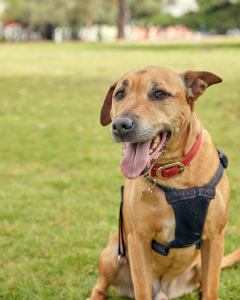Companionship, affection and unconditional love: our pets bring us so much. But what happens when we fall on hard times and can’t bring our furry friends to live with us? We meet the housing providers pushing for pet-friendly accommodation for all, including a cheeky little staffy named Gryphin.
He is my world,” says Kayla about her staffy Gryphin. She watches him as he darts across the grass at the local off-leash dog park, his legs a blur. It’s early in the morning and this place is buzzing with canines. Gryph stops to give the air a good sniff. Then with a lopsided grin he looks over at Kayla and lets out a happy bark before zooming off again.
“He was a bit of a butthole when I first got him – he would escape daily,” she says. At two, he’d been relinquished by his owners and had finally found his forever home with Kayla. “I’d come home, and he just wasn’t there. I’d find him at the oval around the corner from the house watching people playing football and trying to get involved.” She laughs at the memory and looks adoringly at Gryph, now eight. He’s capering about with a fluffy white terrier who’s come over to say hi.
Gryphin is not merely a companion for Kayla, but her lifeline. Through periods of homelessness and addiction, her trusty dog has stood by her side. “Gryph is the most important thing in my life,” she says.
Australia is a country of pet owners. Throughout the pandemic we’ve welcomed them into our families in unprecedented numbers. Pet ownership has climbed from 62 to 69 per cent of households in the last two years, according to Animal Medicines Australia, with one million more dogs attained during the pandemic. Our animals provide companionship and help us combat loneliness. And during a time marked by social distancing and isolation, they’ve given us affection when we’ve needed it the most. For our more vulnerable members of the community, the friendship provided by our pets is felt more keenly. Around one in five Australians experiencing homelessness owns a pet. That’s around 20,000 animals across the country. And it’s no wonder. Their unconditional love, emotional support and security do wonders for our mental health.
Originally from Tasmania, Kayla moved from New South Wales – where she had been living with her mum and stepdad – to Melbourne as soon as she turned 18. “It was pretty tough, but I managed. Not much worried me back then. I was young and just doing whatever,” she says. However, a dependency on drugs and alcohol followed. Then three years ago a faltering relationship brought everything to a head.
“I was living with my partner in a rental. It was a shit relationship – there were a lot of arguments. When we split up, I didn’t have family or anything to fall back on. I didn’t have anywhere to go. I was stuck. I was like, what am I meant to do?”
Kayla found herself looking for emergency crisis accommodation, but discovered none allowed pets at that time. While community organisation Launch Housing was able to provide Kayla a temporary bed, Gryphin wasn’t welcome. With a bed in emergency accommodation hard to come by, a heavy-hearted Kayla took her beloved pet to a kennel.
“I didn’t know for how long I was saying goodbye for. It was terrible. Heartbreaking. And it cost me $200 a fortnight.” An expense that left her with little to live on.
Following a six-month stay at Launch Housing’s Southbank crisis centre, Kayla moved into transitional housing and was reunited with Gryph. The reunion, however, was short-lived. Assaulted by her roommate’s boyfriend, Kayla was forced to moved out. Homeless once again, she knew she had to return to Launch. That meant taking Gryph back to the kennel.
Anyone experiencing homelessness faces numerous barriers to securing accommodation. Rocketing house prices, increasing rents and a lack of affordable housing supply are difficult enough. Own a pet? The task becomes even harder. Most crisis accommodation, community housing, rooming houses and motels are not animal friendly. And while social housing accepts pets, there is a 10-year waiting list. Able to afford a private rental? If you live outside of Queensland, Victoria or the ACT, trying to secure a property with a pet gives any landlord the right to reject your application.
Distressingly, there is also growing research linking pets with family violence. Australian and international research suggests that pet abuse occurs in up to 70 per cent of domestic and family violence cases, with perpetrators using it as a form of intimidation and control over partners and family members. But with most refuges unable to take animals, there have been instances where victims-survivors and their families stay in these abusive relationships to avoid leaving behind their beloved pet.
Things are slowly changing. When Kayla required emergency accommodation for a second time following her unsuccessful stint in transitional housing, Launch Housing was getting ready to trial pet-friendly accommodation – one of the first in Australia to do so. According to Di Morton, a team leader at their East St Kilda crisis centre, “We’ve known for a long time that the relationship we have with our pets, let alone for our clients who are homeless and own a pet, is important. So we’ve put a lot of work into what it would take for us to offer pet‑friendly rooms.”
Launch was able to offer Kayla one of these rooms, and it meant Gryphin was welcome to stay. Together they shared a bedroom at the same crisis centre, its courtyard perfect for the cheeky staffy. Kayla was overjoyed: “I was like, hell yeah!” The benefits of having Gryph with her were immediate.
“It was so much better having him with me. Mental health‑wise, just having him there was such a relief. And having that responsibility to look after my dog meant I used a lot less.”
Fellow residents also reaped the benefits. “They loved it. Every time I walked through the hallway, people were like, ‘Oh my god, Gryphin!’ The morale changed so much.”
Morton has also seen the benefits of pet-friendly crisis accommodation first-hand, not just for residents but for the carers as well. “We love it. It’s a real benefit for the staff. It absolutely changes everything. We do pretty hefty work – it’s not an easy job – so to know that a dog is on site makes a big difference to the morale of staff.
“We’ve just had this old cat – he must have been 18 or 19 – and it was beautiful. He’d sit quietly outside his owner’s room. I’ve got two cats, and I know how important they can be to your life. And we’ve had many dogs and we love having them.”
Since Gryph, they’ve housed numerous cats and dogs, a pet rat and even an axolotl, the surprisingly cute walking fish. According to Launch, they remain one of the few crisis accommodation providers to offer this service nationally.
Similar work has been done to ensure survivors of family violence also have access to pet-friendly crisis accommodation.
In response to the 2016 Royal Commission into Family Violence, the Victorian government is replacing communal refuge accommodation with more independent housing that will allow for animals. For example, Safe Steps, Victoria’s family violence response centre, now provides access to cat‑ and dog-friendly crisis accommodation that also includes food, bedding, toys and vet care. The RSPCA in New South Wales is actively working with the City of Sydney, as well as several refuges, including Dignity in Sydney and Liberty in Port Macquarie, to help them convert to a pet‑inclusive model.
There have also been pet-friendly changes made in private rentals. Legislation recently introduced by the Queensland government will help those families forced to surrender their pets in the scramble to secure housing in the face of a worsening rental crisis. Victoria and ACT are the only other Australian territories with similar legislation already in place.
It’s been almost four years since Kayla was in emergency crisis accommodation. Now sober for over a year, working and in permanent housing with a brand-new partner, life is sweet. And with Gryph by her side, it feels like anything is possible.
Words by Anastasia Safioleas, Contributing Editor of The Big Issue Australia.
Photos by James Braund.
First published ed#651 of The Big Issue.

